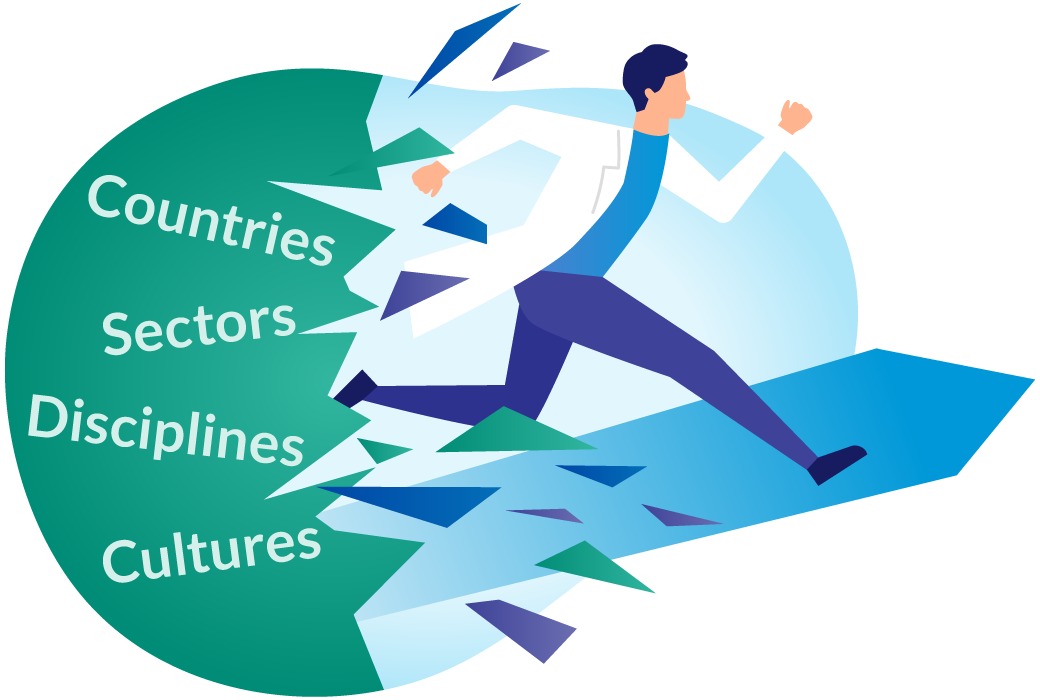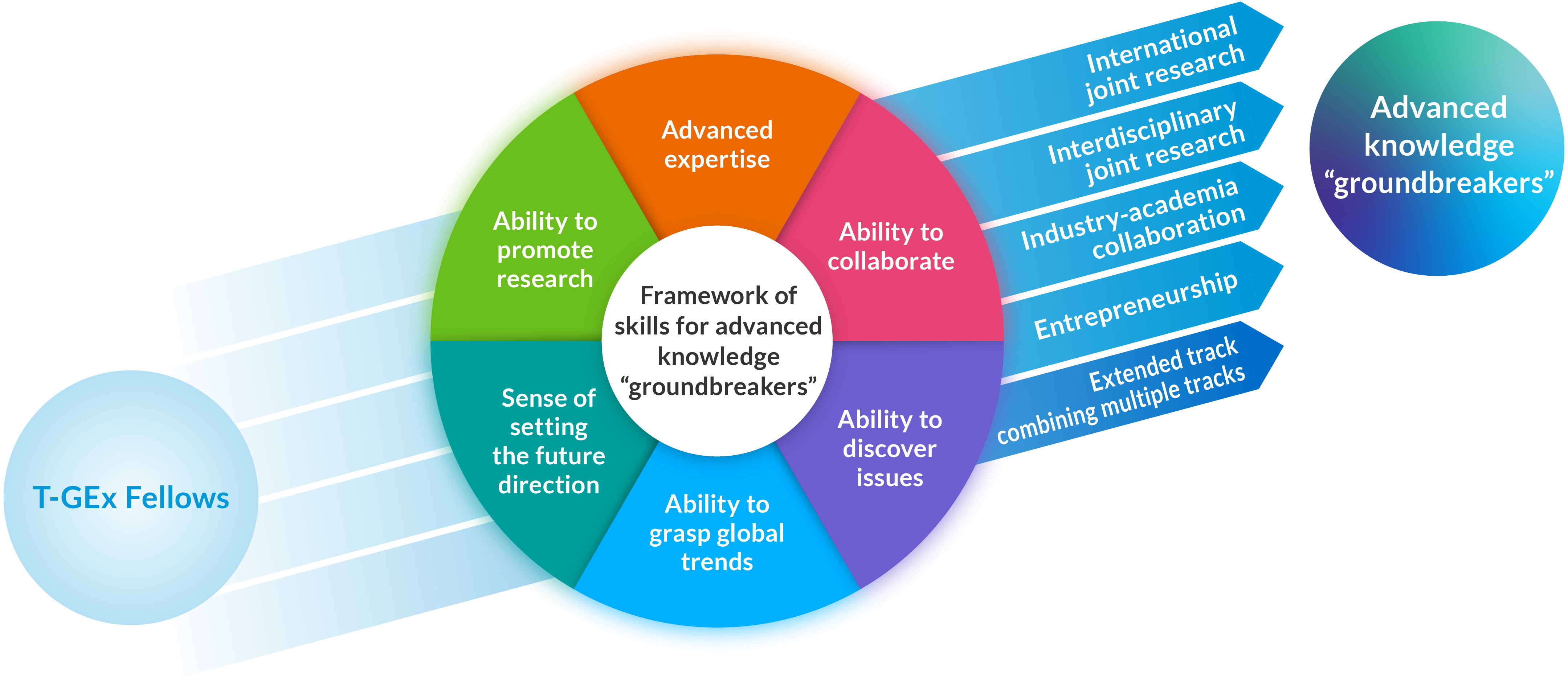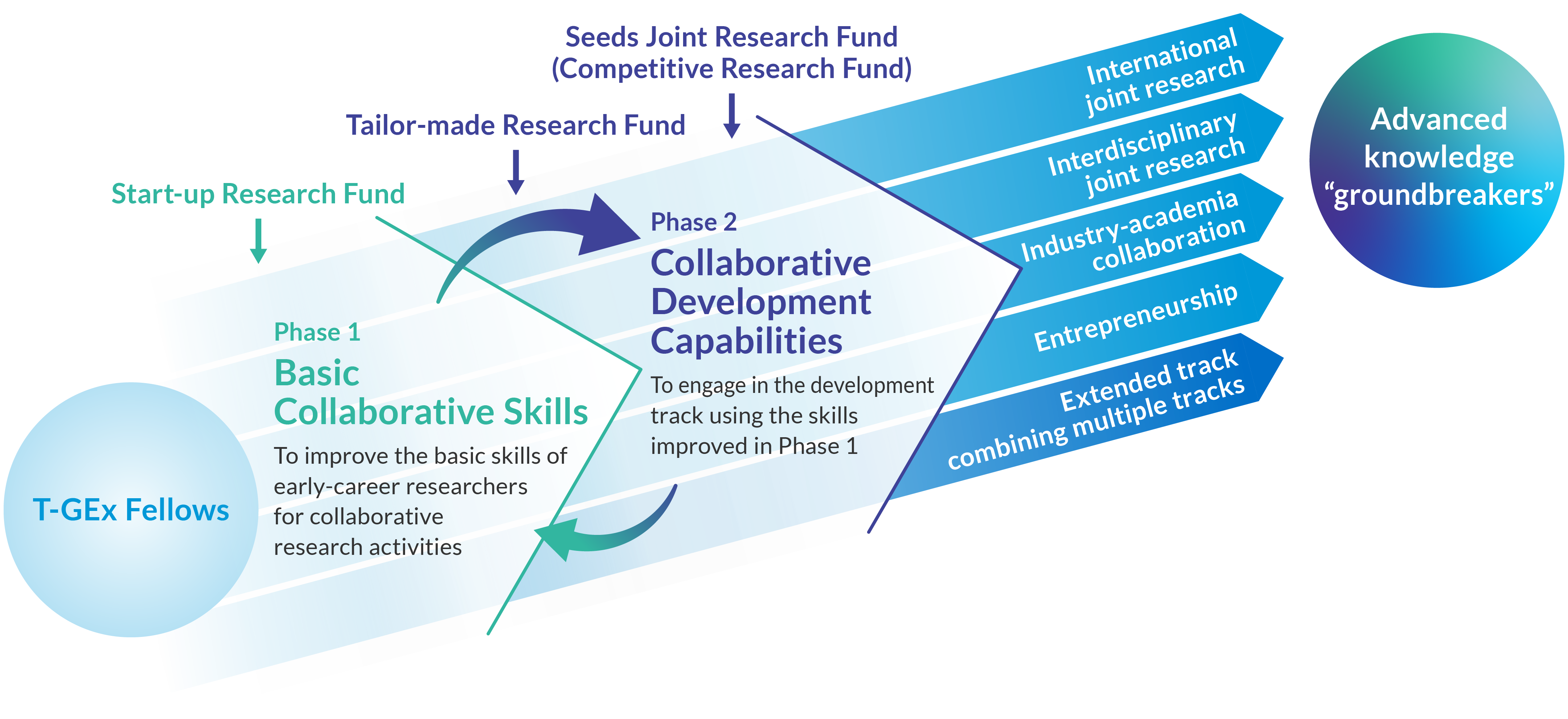Program Policy

T-GEx aims to nurture advanced knowledge “groundbreakers” who will break down barriers between countries, sectors, disciplines, and cultures. They will continuously tackle new challenges by linking knowledge creation and experiences from different fields while leading teams to solve critical problems that our world is facing. These advanced knowledge “groundbreakers” share the same abilities and skills, such as “advanced expertise,” “ability to collaborate,” “ability to discover issues,” “ability to grasp global trends,” “sense of setting the future direction,” and “ability to promote research.” Simultaneously, they have different perspectives and directions for the future. In order to satisfy their needs, T-GEx formulates a training plan which enables T-GEx Fellows to evolve themselves and make progress as world-class researchers in a direction of their own (tracks). There are five tracks in this program: “international joint research”, “interdisciplinary joint research”, “industry-academia collaboration”, “entrepreneurship”, and an “extended track” that can be combined with these tracks.

Program Outline
The T-GEx program consists of two phases: Phase 1 and Phase 2. In Phase 1, T-GEx Fellows and T-GEx Associates develop their “Basic Collaborative Skills” by participating in seminars to acquire transferable skills and have opportunities to build research networks with other members of the program.
In Phase 2, T-GEx Fellows are expected to enhance their “Collaborative Development Capabilities.” They can select a track that meets their needs and develop their research capabilities to a high level through joint research projects. The program offers them research funding and mentoring support in this phase.
In addition, in order to support the activities of the early-career researchers, the T-GEx program will work with partner institutions in the consortium to improve the research environment and research infrastructure, including the development of a system for joint use of research equipment and facilities, and the sharing of good practices in supporting work-life balance of the researchers.

Phase 1Phase of improving basic skills
- To launch research aimed at solving global issues (Start-up Research Fund)
- Participate in Skill Booster Modules
Phase 2Phase of engaging in the training track
- To select one of the five tracks (international joint research, interdisciplinary joint research, industry-academia collaboration, entrepreneurship, and the extended track which combines the other tracks) to advance your research (Tailor-made Research Fund)
- To promote joint research and joint projects between T-GEx Fellows and T-GEx Associates (Seeds Joint Research Fund)
Research Infrastructure
- Platform development
- Shared use of research equipment and facilities
- Work-life balance support
Research Environment
- Provision of research space
Personal Support
- Academic mentor
- Corporate advisor
- URA (University Research Administrator), administrative staff
Details of Support Action
Support for the Improvement of Research Environment
- To set up a research environment where T-GEx Fellows can concentrate on their research
- To secure a 50% research effort rate through being affiliated or holding a cross appointment with the Nagoya University Institute for Advanced Research (IAR)
- To offer research space of about 50㎡ upon request
Research Funding Support
Start-up Research Fund
To provide a research fund to be dispensed for the proposed research that aims to solve global issues
*Maximum ¥500,000 (only in the 1st year of the program)
Tailor-made Research Fund
To propose a research plan to solve global issues by selecting one of the five tracks (international joint research, interdisciplinary joint research, industry-academia collaboration, entrepreneurship, and the extended track) and receive measured funding to execute the plan.
*Maximum ¥3 million per year (from the 2nd year of the program)
Seeds Joint Research Fund
Joint research or joint projects with T-GEx Fellows and T-GEx Associates are strongly recommended.
*The amount of support available is determined according to each year’s budget conditions.
Skill Booster Modules: To provide programs to improve transferable skills and networking opportunities with researchers from different fields and industries
- To provide seminars and training programs that assist early-career researchers in the improvement of skills necessary for PIs, such as interdisciplinary and cross-cultural communication and management skills
- To set up networking opportunities with early-career researchers and experts in diverse fields
- To hold consortium-sponsored exhibitions of research outcomes and international symposiums
Research Capability Assessment Tools
- To manage and analyze research activities and the state of transferable skills development by using e-portfolio
Support from Mentors, Advisors, and URAs
- To support the advancement of research by assigning academic mentors and corporate advisors according to the proposed research plan
- To provide support from University Research Administrators (URAs) to conduct research capability analysis, promote research activities, advance joint research projects and outreach activities, and manage intellectual property rights
Skill Booster Modules
To plan and hold seminars, training programs, and networking opportunities to expand and build research networks and improve transferable skills
-
Networking
To offer opportunities for early-career researchers (T-GEx Fellows and T-GEx Associates) to deepen the understanding of research in diverse fields and industries and to learn new perspectives to be reflected in their own research through exchanges with early-career researchers from companies and other organizations.
-
Management Skills
To improve team management ability by learning the skills needed to manage their own research and work duties, as well as their laboratory and research team.
-
Communication Skills
To learn various communication methods and styles necessary for research and educational activities. This enables early-career researchers to grasp a way to optimize their communications by considering the nature of the occasion and the audiences, and to effectively build and run a research team.
-
Social Engagement
To provide opportunities to learn knowledge, ideas, and methods necessary for conducting industry-academia collaboration and joint ventures with companies, public organizations, and international organizations, as well as the needs of industry and society. This enables early-career researchers to think about and clarify a vision of the business and social impacts of research outcomes.
-
Role Model Study
To provide the opportunity to reflect on one's own career to date and to think about the future career path through interactions with people who have carved out outstanding careers in their own unique ways (e.g., exchange with diverse human resources with outstanding careers)
-
Retreat
To examine one’s own research activities and actions as leaders through sharing and reviewing the research activities and experiences of T-GEx Fellows and T-GEx Associates. This leads to the further advancement and progress of knowledge “groundbreakers.”

